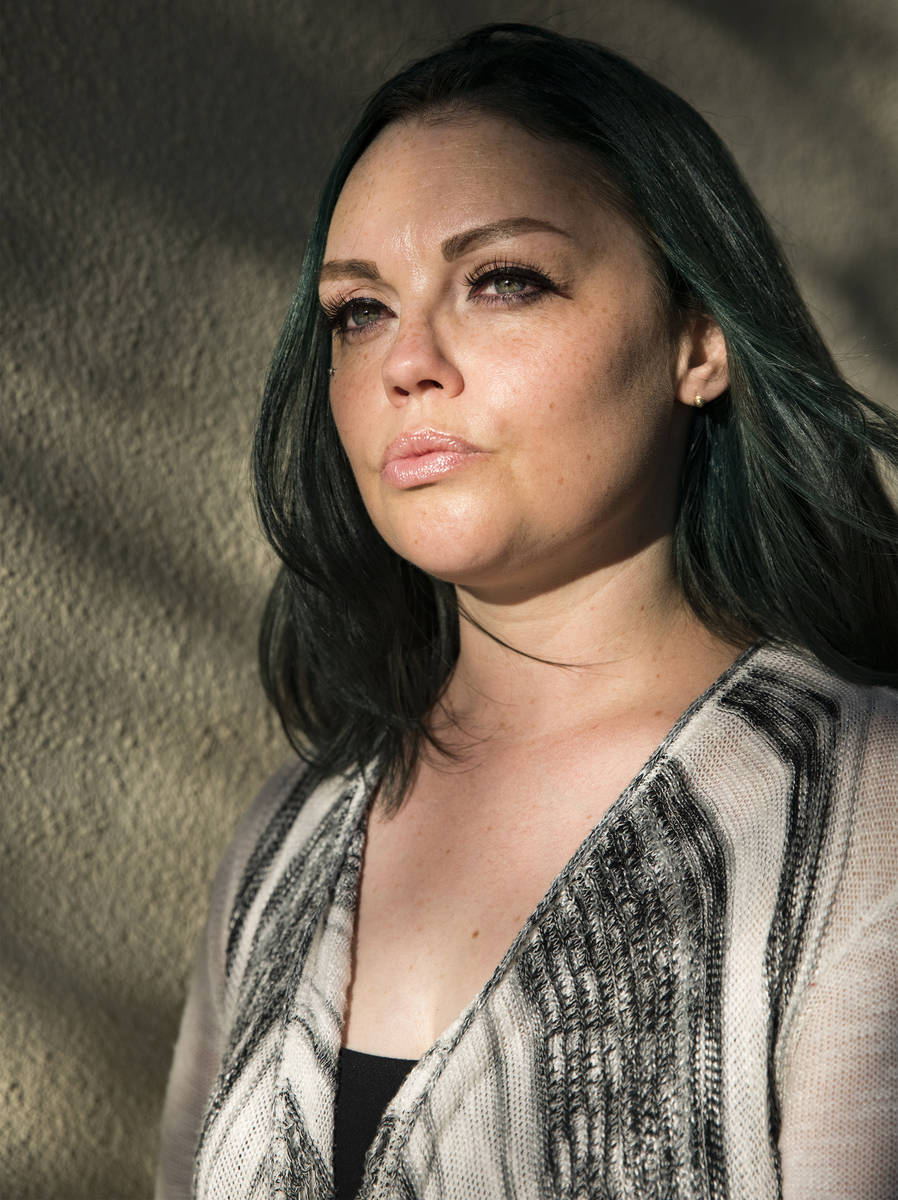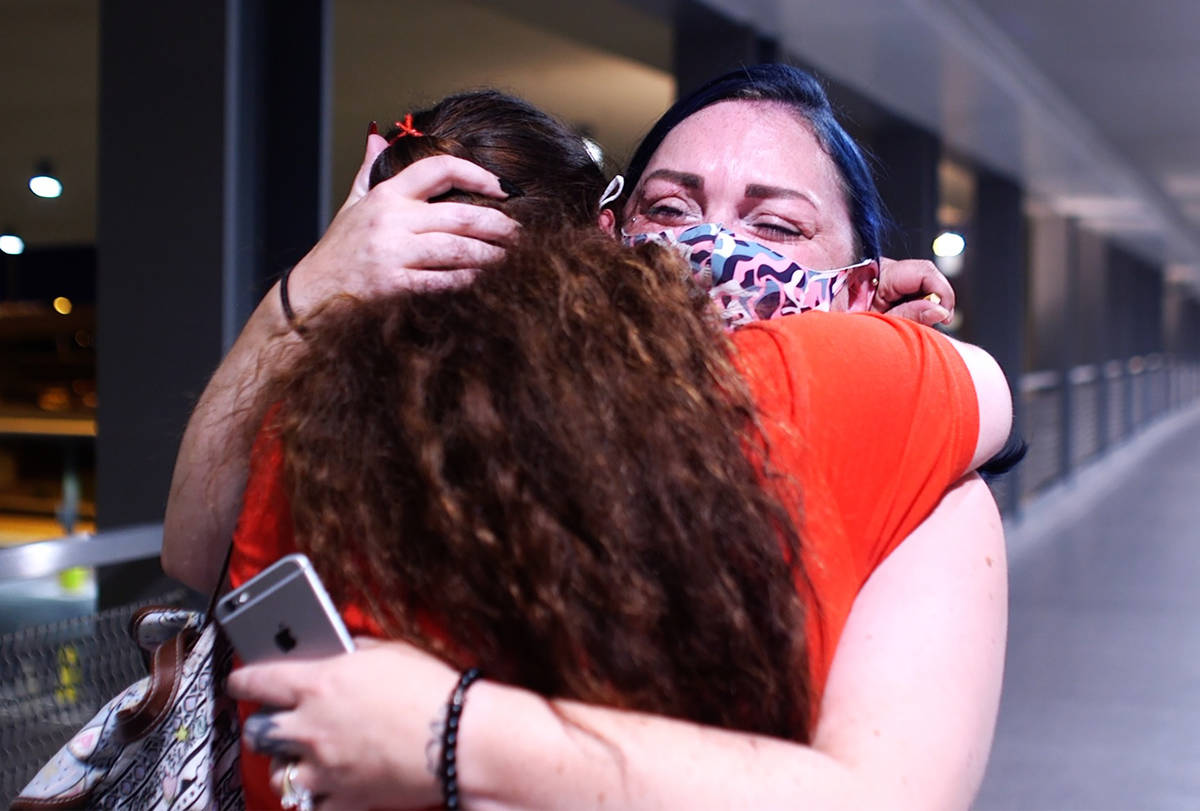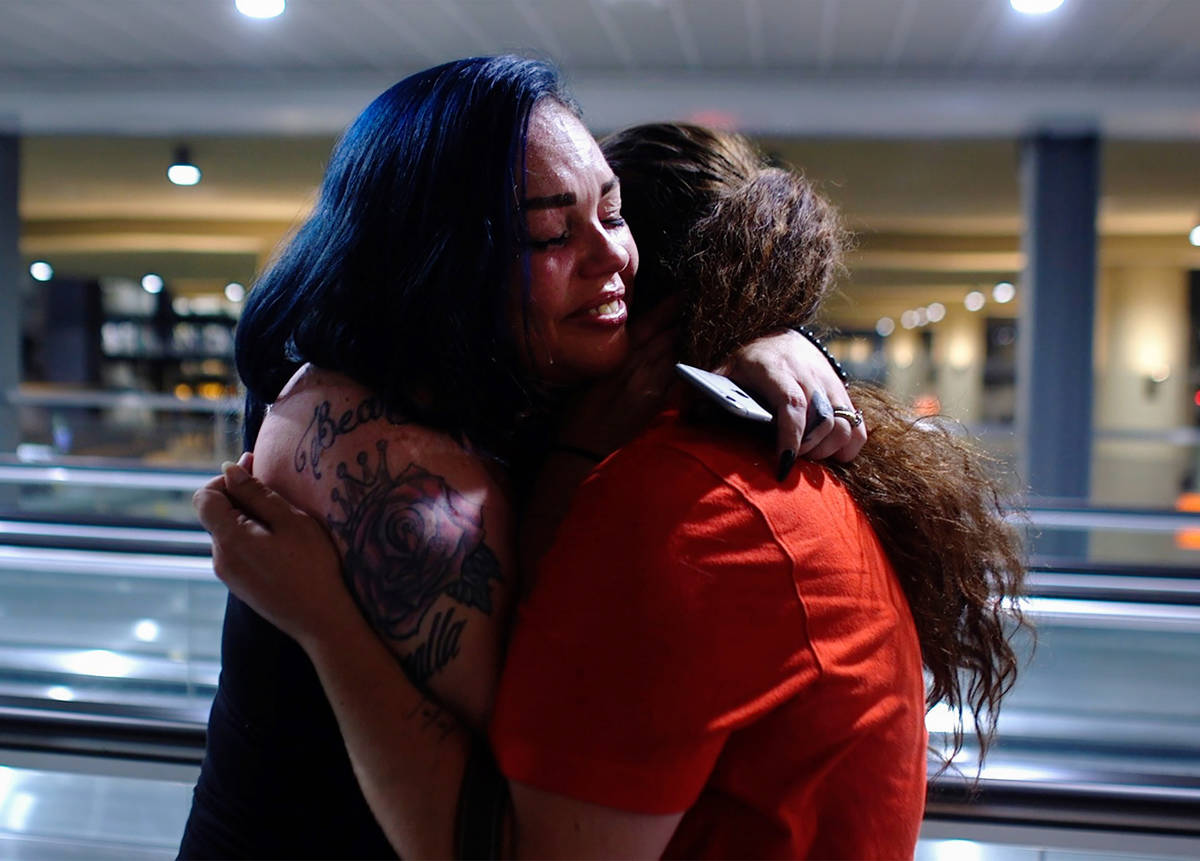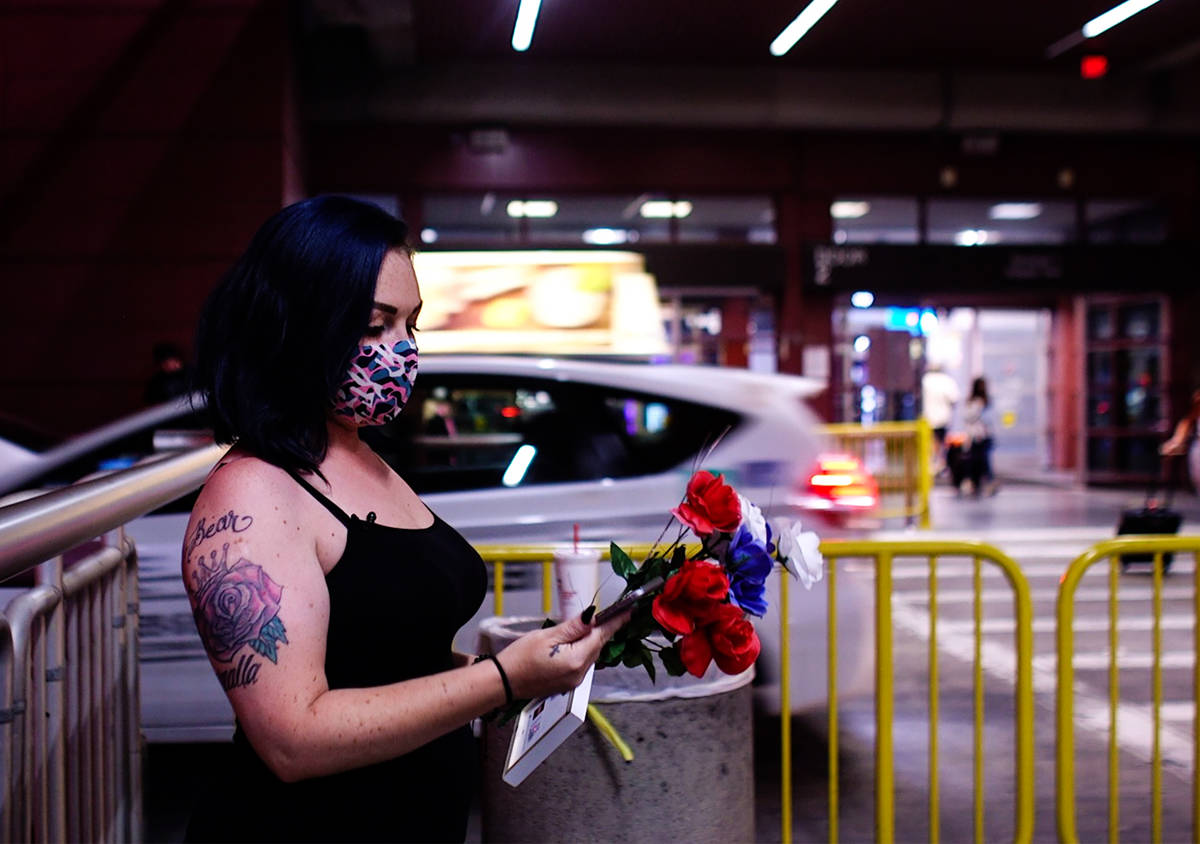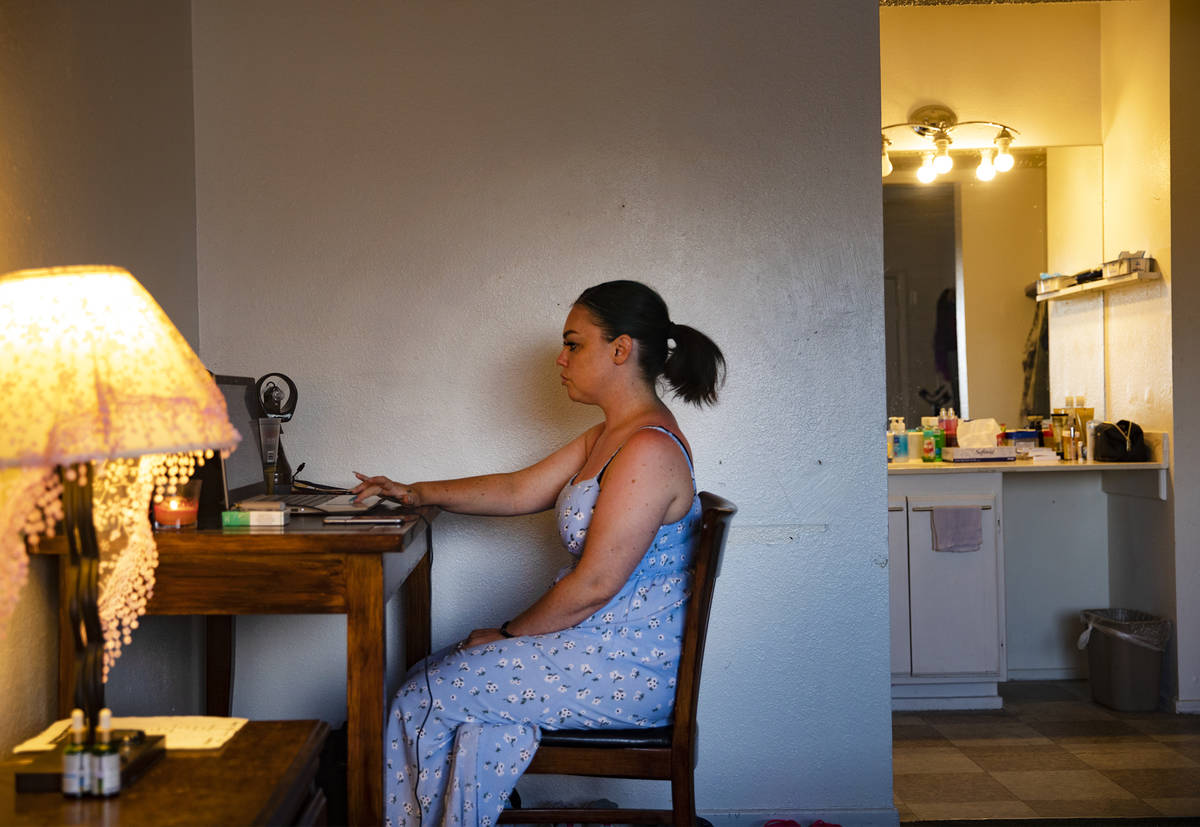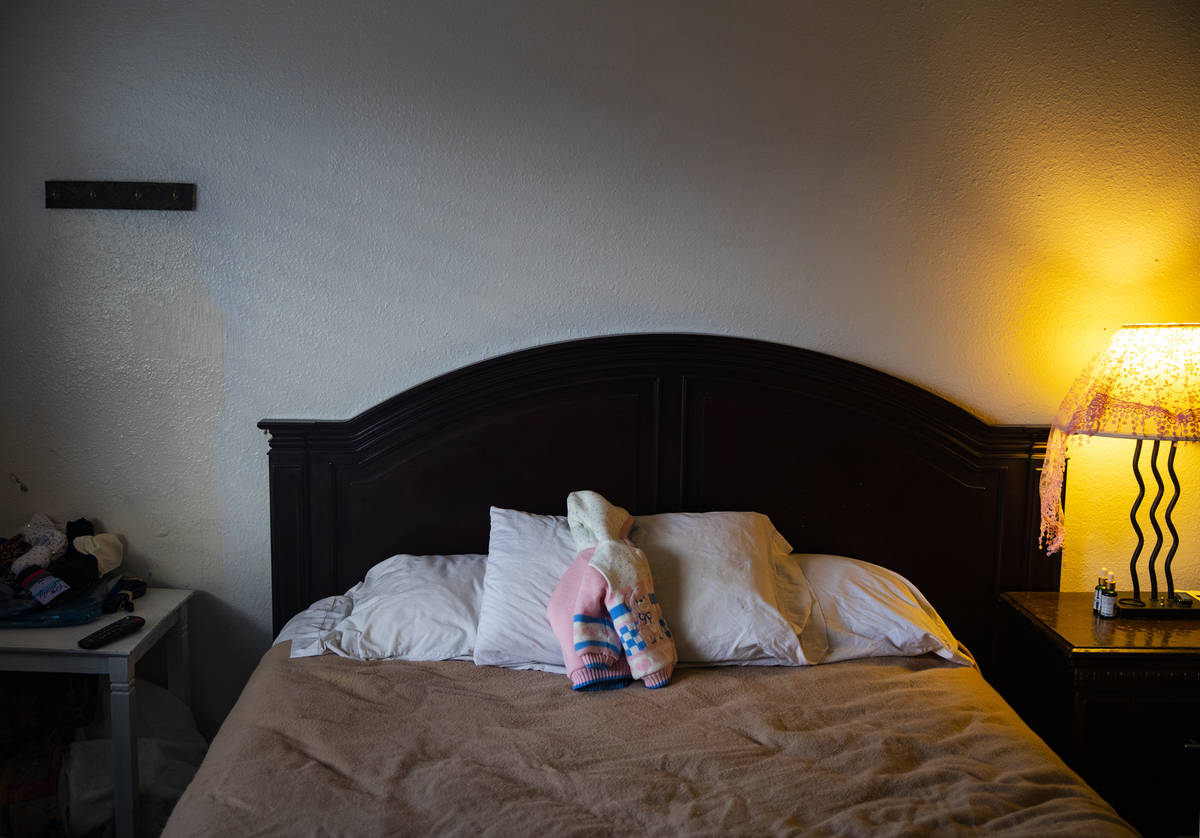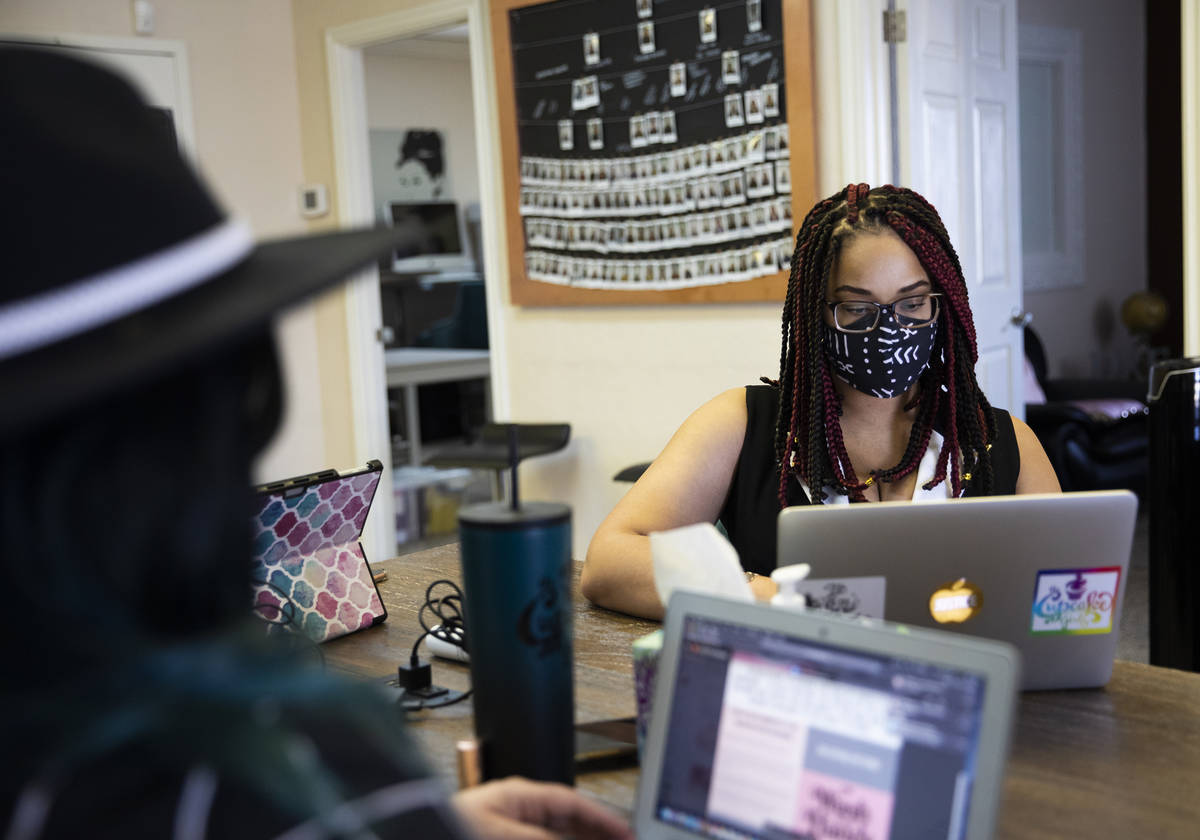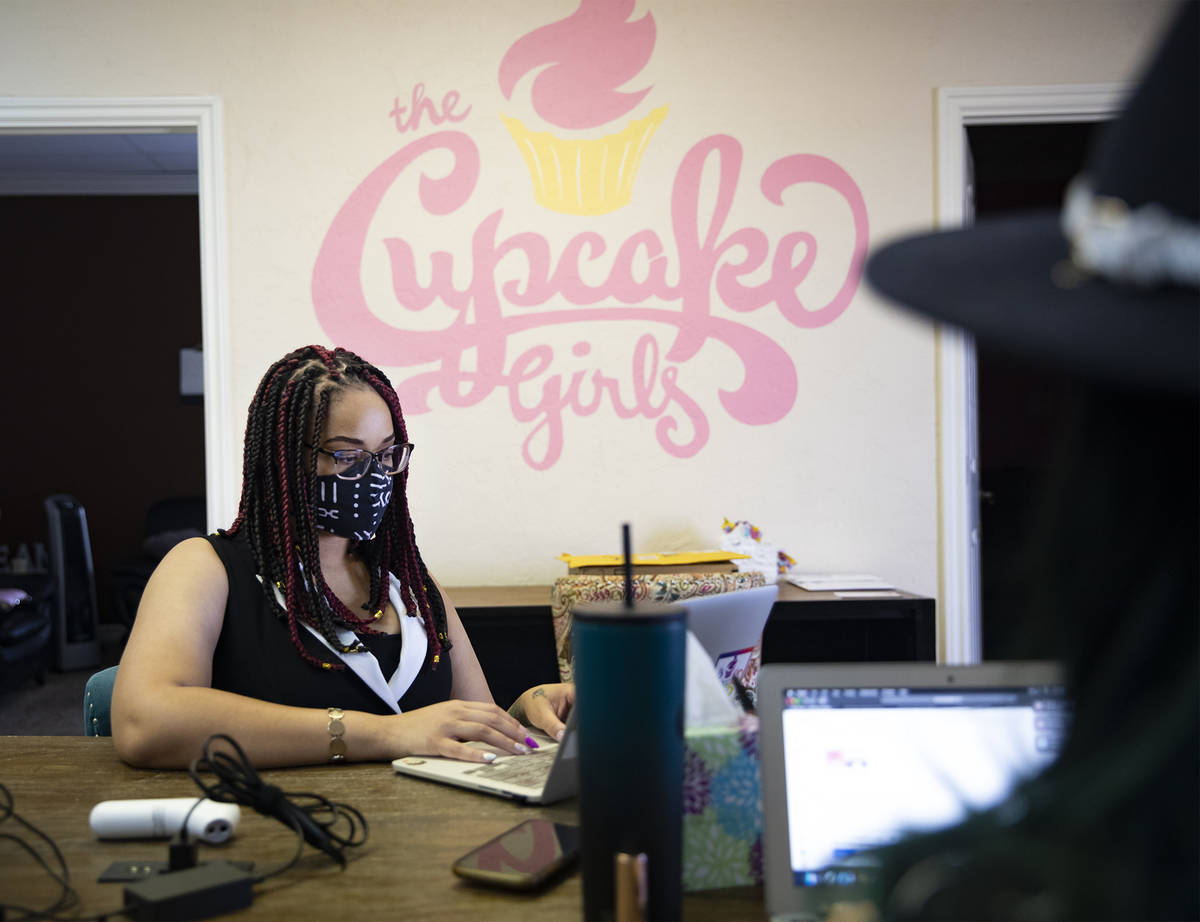Boulder City woman says she was a sex trafficking victim, not a murderer
Alisha Burns spent the past 17 years in and out of prison for a murder she swears she didn’t commit.
But on Friday, she’ll get a chance at a fresh start.
Burns, now 33, has been granted an evidentiary hearing, which will allow her legal team to argue her innocence and allow a judge to reconsider the evidence. The goal? To persuade the judge to reverse her second-degree murder conviction.
“If this works in our favor, I could get on with my life,” Burns said in a recent interview outside the Regional Justice Center. “I can just live my life like a real person and not constantly be afraid that the smallest thing can send me back to prison.”
With three prison stints — which included months in solitary confinement and an unusual contact visit with her co-defendant — under her belt, the Boulder City resident hopes to eliminate the lifetime parole still hanging over her head. With it comes the fear that even a minor violation could land her back behind bars.
Burns said it all began when she became a victim of sex trafficking as a 15-year-old foster child in Ohio. She claims she was kidnapped and taken to Las Vegas in 2002 by a then-32-year-old man she thought was her boyfriend. By 2003, Burns and the man, Steven Kaczmarek, had been arrested and imprisoned on murder charges.
The crime
Metropolitan Police Department records show that on Sept. 25, 2002, Burns and Kaczmarek went to Apartment 25 at the Uptown Motel, 813 Ogden St.
Burns claims Kaczmarek forced her to accompany him and help him with a robbery. She said he posed as a pimp and had her act as a prostitute for wealthy-looking men. When they got to the men’s homes, Kaczmarek would rob them. She said she never had sex with the men.
In this case, their target was 58-year-old Pedro Villareal. According to police records, Burns told officers they chose Villareal because he looked rich. She baited him with sex, and when they got to his apartment, Kaczmarek attacked him from behind.
Just after midnight on Sept. 27, 2002, maintenance worker Thomas Riddle responded to Apartment 25 in response to complaints from a neighbor of water leakage.
When he entered the apartment, police records show, Riddle found Villareal dead in the bathtub. He called police, who found Villareal facedown in the tub with a pillowcase over his head, a blood-soaked sock in his mouth, two abrasions on his back, and his wrists and ankles tied together with an electrical cord.
Police records show that Kaczmarek pawned a blank gold ID bracelet and a VCR “shortly after the murder” at Gold and Silver Pawn Shop, 713 Las Vegas Blvd. South. Villareal’s family told police that the bracelet matched the description of one the victim wore and that a VCR also was missing from his apartment.
The arrests
Burns said the two were arrested about a week and a half later at the Stardust, a Strip casino that since has been razed. She said they were stopped by security, who checked their IDs and found that Kaczmarek was a convicted sex offender who was on parole and wanted out of Illinois and Ohio.
“Social services were called because I was a runaway from Ohio, and they shipped me back to Ohio and they took him to jail,” Burns said. “They took him to jail for 15 counts of sexual assault of a minor, statutory sexual seduction and kidnapping, and I was his victim.”
Later in October, Kaczmarek was arrested in the murder case.
On Nov. 22, 2002, a Las Vegas judge ordered that Burns be returned to Las Vegas to testify against Kaczmarek in the sexual assault case. Burns said she refused to testify against him because she believed they were in love.
“They asked me to testify against him, and I told them no,” Burns said. “I was a victim of sex trafficking. I was manipulated. My mind was all screwed up from being with him, from the things he said to me and told me. I was a foster child, and he told me that he loved me, that nobody else loved me.”
When she refused to testify, the sexual assault charges were dropped, and Burns was brought on as a co-defendant in the murder case. She was arrested and booked into the Clark County Juvenile Detention Center.
The plea deal
Burns was offered a sentence of 10 years to life in prison in exchange for a guilty plea, court records show.
But then, according to Burns’ lawyer Tony Abbatangelo, the two co-defendants were granted a contact visit by then-District Judge John McGroarty.
“I’ve been doing this for 30 years now and I have never seen a contact visit between two inmates,” Abbatangelo said. “The more unique thing, or interesting thing, to me was that there was a judicial order signed by a judge permitting this contact to occur, and I’ve never seen or heard of anything of that nature.”
Court records show that Burns’ public defender, Phil Kohn, said in court on April 1, 2003, that his client was “seriously considering” the plea deal but was “sort of wavering a little.”
Two weeks later the judge ordered the contact visit — during which, Burns claims, Kaczmarek coerced her into taking the deal.
“He had told me because I was 15 that I was only going to do a year or two, that I wouldn’t be in past my 20th birthday,” Burns said. “He told me that I had the power to help both of us. And I fell for it.”
She ultimately pleaded guilty to second-degree murder on April 21, 2003, court records show. She was sentenced on June 9, 2003, to life with the possibility of parole after 10 years.
Burns was kept in solitary confinement because she was a child charged as an adult.
“The only person that I was having any contact with at all was my trafficker,” Burns said. “He was writing me letters daily, even in solitary confinement. I couldn’t talk to my social worker, but I was allowed to communicate with my trafficker.”
Burns was released after 10 years at the Florence McClure Women’s Correctional Center but said she ended up back in prison after breaking parole less than a year later.
“When I was released, I was still very much a 15-year-old trying to be an adult in a city where I knew nobody,” Burns said. “I had no family, no friends, and I was expected to learn to get a job and be a functional member of society. And that didn’t happen.”
She was charged with absconding from parole and taken back into custody, where she served another two years. She was released for a year after that but ended up back in prison for an additional three years. She was last released this summer, on July 15.
Kaczmarek is serving a life sentence at Ely State Prison.
The evidentiary hearing
Abbatangelo said he thinks the defense has a strong case. But the first legal hurdle is a time limit.
Typically defendants can argue the lawfulness of their detention through what’s known as a writ of habeas corpus only within a year of their case being closed. In this case, Burns is about 15 years late, and the state is arguing that point strongly, claiming that “there is no good cause or prejudice to overcome the multiple, mandatory procedural bars,” court records show.
According to a document filed by prosecutors on July 1, 2019, that point is not negotiable.
“The time bar — and other procedural bars — are mandatory and cannot be waived by the parties or the courts,” Chief Deputy District Attorney Steven Owens wrote. “The Nevada Supreme Court has held that the District Court has a duty to consider whether a defendant’s post-conviction petition claims are procedurally barred.”
Chief Deputy District Attorney Christopher Hamner, the current prosecutor on the case, declined to comment for this story.
Abbatangelo said Burns filed the writ while she was still a minor in custody but withdrew it because of health issues.
“That’s our argument,” he said. “There’s no secret about it.”
Prosecutors also have argued that no new evidence undermines Burns’ confession and proves her innocence. But Burns argues that it’s important to address the public’s newfound understanding of sex trafficking and its victims.
“Experts on this topic did not exist 18 years ago,” Burns said. “Had they existed 18 years ago, this probably wouldn’t have been the outcome.”
Burns said she saw a local nonprofit called The Cupcake Girls on the news about a year ago and reached out for help. She said the group, which assists sex workers and survivors of sex trafficking, set her up with a caseworker who got her a dentist and an OB-GYN, as well as rent assistance and a support group. The Cupcake Girls will attend her hearing on Friday.
Joy Hoover, the organization’s founder and CEO, said women like Burns experience what are called Romeo traffickers, who pose as boyfriends and convince their victims that they’re in love.
Bri Alex, program manager at The Cupcake Girls, explained that younger victims are more vulnerable. She said many young women fall victim to Romeo traffickers.
“There’s definitely power dynamics at play, especially if the trafficker is a much older person, much more experienced in the world, and especially when you’re talking about a teenager,” Alex said.
Abbatangelo said he has a good amount of evidence to defend Burns, if the case gets that far. He said new developments in forensic science have proven that Villareal died on Sept. 27, 2002, two days after Burns and Kaczmarek were in his apartment.
District Judge Tierra Jones will preside over the evidentiary hearing.
The future
Burns said she had two children — a daughter who is now 6 and a son who is now 4 — in the time that she was out of prison, but when she went back in 2017, she was forced to relinquish her parental rights.
“They have both been adopted, and they’re both with very good families,” Burns said through tears. “I have an open adoption agreement with my son’s family, but my daughter’s family opted for a closed adoption because of my criminal record.”
She said she wants to see them more, especially her daughter, but she wouldn’t want to remove either of them from their adopted families.
“They’re happy and they’re healthy and they’re stable, and that’s what I want for them,” Burns said. “But I do hope I could be in her life.”
On July 16, the day after she was released, Burns married Vincent Parker. The two met at a barbecue in 2013, six months before Burns’ second stint in prison.
Parker said it’s been difficult to see his wife go through this, but he’s loved watching her grow and become stronger. He said he thinks the distance helped strengthen their relationship and that their shared experiences have brought them closer together. He said a lot of people see Burns’ criminal record before they get to know her, and he thinks it leads to misconceptions.
“She’s just a really good-hearted person, and she wants another chance,” Parker said. “She wants a fair swing at life.”
Burns said she’s trying to get permission to move to Washington state, where she would live with her husband and her 15-year-old stepson. Whenever she gets there, Burns said, the couple plans to utilize the cosmetology training she received while she was incarcerated to open up a barbershop.
“We’d like to have a baby, but I’m kind of afraid to do that,” Burns said. “With this lifetime supervision over my head, I feel like I can’t get on with my life.”
Contact Alexis Ford at aford@reviewjournal.com or 702-383-0335. Follow @alexisdford on Twitter.



